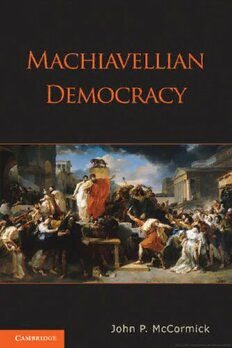
Machiavellian Democracy PDF
Preview Machiavellian Democracy
MachiavellianDemocracy Intensifying economic and political inequality poses a dangerous threat to the liberty of democratic citizens. Mounting evidence suggests that economic power, not popular will, determines public policy, and that elections consistently fail to keep public officials accountable to the peo- ple.JohnP.McCormickconfrontsthisdiresituationthroughadramatic reinterpretation of Niccolo` Machiavelli’s political thought. Highlighting previously neglected democratic strains in Machiavelli’s major writings, McCormickexcavatesinstitutionsthroughwhichthecommonpeopleof ancient, medieval, and Renaissance republics constrained the power of wealthy citizens and public magistrates, and he imagines how such insti- tutionsmightberevivedtoday.MachiavellianDemocracyfundamentally reassesses one of the central figures in the Western political canon and decisively intervenes into current debates over institutional design and democraticreform.InspiredbyMachiavelli’sthoughtsoneconomicclass, politicalaccountability,andpopularempowerment,McCormickproposes acitizenbodythatexcludessocioeconomicandpoliticalelitesandgrants randomlyselectedcommonpeoplesignificantveto,legislative,andcensure authoritywithingovernmentandoverpublicofficials. John P. McCormick is Professor of Political Science at the University of Chicago.HewaseducatedatQueensCollege,CityUniversityofNewYork (CUNY),andtheUniversityofChicago.HehasbeenaFulbrightscholar inBremen,Germany;aMonnetFellowattheEuropeanUniversityInsti- tute,Florence;andaRadcliffeFellowatHarvardUniversity.McCormick istheauthorofCarlSchmitt’sCritiqueofLiberalism:AgainstPoliticsas TechnologyandWeber,Habermas,andTransformationsoftheEuropean State:Constitutional,Social,andSupranationalDemocracy.Hehaspub- lished numerous articles on contemporary democratic theory, Florentine politicalandconstitutionalthought,andtwentieth-centuryGermanlegal, political, and social theory in scholarly journals, including Modern Law Review,AmericanPoliticalScienceReview,andPoliticalTheory. For Annabelle Machiavellian Democracy JOHN P. McCORMICK UniversityofChicago cambridgeuniversitypress Cambridge,NewYork,Melbourne,Madrid,CapeTown,Singapore, Sa˜oPaulo,Delhi,Dubai,Tokyo,MexicoCity CambridgeUniversityPress 32AvenueoftheAmericas,NewYork,ny10013-2473,usa www.cambridge.org Informationonthistitle:www.cambridge.org/9780521530903 (cid:2)C JohnP.McCormick2011 Thispublicationisincopyright.Subjecttostatutoryexception andtotheprovisionsofrelevantcollectivelicensingagreements, noreproductionofanypartmaytakeplacewithoutthewritten permissionofCambridgeUniversityPress. Firstpublished2011 PrintedintheUnitedStatesofAmerica AcatalogrecordforthispublicationisavailablefromtheBritishLibrary. LibraryofCongressCataloginginPublicationdata McCormick,JohnP.,1966– Machiavelliandemocracy/JohnP.McCormick. p. cm. Includesbibliographicalreferencesandindex. isbn978-0-521-82390-6(hardback)–isbn978-0-521-53090-3(pbk.) 1.Machiavelli,Niccolo`,1469–1527. 2.Democracy–History–To1500. 3.Democracy–History–16thcentury. I.Title. jc143.m4m34 2010 321.8–dc22 2010022940 isbn978-0-521-82390-6Hardback isbn978-0-521-53090-3Paperback CambridgeUniversityPresshasnoresponsibilityforthepersistenceoraccuracyofurlsfor externalorthird-partyInternetWebsitesreferredtointhispublicationanddoesnotguarantee thatanycontentonsuchWebsitesis,orwillremain,accurateorappropriate. Contents Preface pagevii AbbreviationsforMachiavelli’sWritings xi Introduction: Liberty,Inequality,andPopularGovernment 1 part i 1 Peoples,Patricians,andthePrince 21 2 DemocraticRepublicsandtheOppressiveAppetiteofYoung Nobles 36 part ii 3 TheBenefitsandLimitsofPopularParticipationand Judgment 65 4 Elections,Lotteries,andClass-SpecificInstitutions 91 5 PoliticalTrialsand“theFreeWayofLife” 114 part iii 6 RepublicanismandDemocracy 141 7 Post-ElectoralRepublicsandthePeople’sTribunateRevived 170 Notes 189 Acknowledgments 221 WorksCited 225 Index 247 v Preface Acrisisofpoliticalaccountabilitybesetscontemporarydemocracy.Mounting evidence suggests that elections, even “free and fair” ones, do not elevate to officeindividualswhoareespeciallyresponsivetothepoliticalaspirationsand expectations of their constituents. Moreover, democratic governments seem decreasingly adept at preventing society’s wealthiest members from wielding excessive influence over law and policy making. Rather than facilitating pop- ularrule,electoraldemocraciesappeartopermitandperhapsevenencourage political and economic elites to enrich themselves at the public’s expense and encroachuponthelibertyofordinarycitizens.Theinabilityofcitizenstocon- trol the behavior of public officials and counteract the power and privilege of thewealthyposesagravethreattothequalityofpoliticalrepresentationtoday; itseverelydebilitatesconditionsoflibertyandequalitywithintherepublicsof ourage. Inspired by the most astute analyst of republics from earlier ages, Niccolo` Machiavelli, this book reconsiders constitutional measures and institutional techniques that popular governments before modern democracy devised to surveil and control political and economic elites. In order to repel the threat that such elites posed to liberty and equality, common citizens within tradi- tionalrepublicsproposedandoftenenactedaccountabilitymeasuresfarmore extensivethancompetitiveelections.GuidedbyMachiavelli’sendorsementof such measures and his extensive analyses of the Venetian, Florentine, and, especially, Roman constitutions, I have identified the following components ofarobust,extra-electoralmodelofeliteaccountabilityandpopularempow- erment:officesorassembliesthatexcludethewealthiestcitizensfromeligibil- ity;magistrateappointmentproceduresthatcombinelotteryandelection;and political trials in which the entire citizenry acts as ultimate judge over prose- cutionsandappeals.Inamethetypeofpopulargovernmentthatincorporates suchinstitutions“MachiavellianDemocracy.” Historically,politicalandeconomiceliteswithinrepublicsresistedpopular demands for such institutions, and the numerous philosophers and historians vii viii Preface who served as spokesmen for aristocratic republics stridently denounced such measures. Indeed, thinkers such as Aristotle, Cicero, Guicciardini, and Madison,whopreferredconstitutionalarrangementsthatinimportantrespects insulate political and economic elites from popular control, have dominated Westernpoliticalthought.BeforesignificantnumbersofEuropeanandcolonial intellectualsbegantochampionprogressiveandradicaldemocraticmovements inthenineteenthcentury,Machiavelliwasarguablytheonlymajorintellectual advocate of republics in which the people vigorously contest and constrain the behavior of political and economic elites by extra-electoral means. In this Machiavellian spirit, I conclude the book with reform proposals drawn from elite-constrainingandcitizen-enablingmeasuresdebatedorenactedinnotable ancient, medieval, and Renaissance republics – most important among them, theinstitutionthatearnsMachiavelli’shighestpraise,thetribunesoftheplebs from republican Rome. Specifically, I propose, as a thought experiment, a “People’sTribunate”tobeamendedtotheUnitedStatesConstitution. Institutional prescriptions aside, this book accentuates the fundamentally populist – that is, citizen-empowering – and anti-elitist foundation of Machi- avelli’s political thought. I ultimately suggest that Machiavelli ought to be in- terpreted as a democrat and not a “republican” – at least not as the influential“CambridgeSchool”approachtointellectualhistorydefines“repub- licanism”andasitdepictstheillustriousFlorentinesecretary’srelationshipto it. As already mentioned, the vast majority of republics emulated and their advocatesespousedaristocraticratherthandemocraticconstitutionalmodels. Therefore, I will argue, republicanism generally indulged, in theory and prac- tice, far more dominance of domestic politics by socioeconomic elites than Cambridge-associated or -influenced scholars such as John Pocock, Quentin Skinner,andPhilipPettitacknowledge,andcertainlymorethanMachiavelli’s writings ever countenance. Such commentators consistently ignore or acutely underplay Machiavelli’s endorsement of class-specific offices, extra-electoral modesofappointingandpunishingpublicofficials,andassemblieswherecom- moncitizensbroadlydiscussanddirectlydecidepublicpolicy. On my interpretation, Machiavelli prompts us to rethink fundamentally the institutional and cultural requirements of political participation and elite accountabilitywithinpopulargovernment.UnlikerepublicanssuchasCicero, Guicciardini, the young Madison, or later advocates of electoral democracy suchasWalterBagehotandJosephSchumpeter,Machiavelliseekstomitigate rather than simply exploit common citizens’ general deference to socioeco- nomic and political elites. Indeed, liberty, according to Machiavelli, depends oninstitutionsthatrespondtoandevenfurtherencourageapopulardisposition of distrust, bordering on animosity, toward wealthy and prominent members ofthecitizenryandthegovernment. In short, Machiavellian Democracy refocuses attention on the necessity of properlyinstitutionalizedclassconflictforhealthydomesticpoliticswithinpop- ular governments. It revives Machiavelli’s forgotten lesson that the resources of wealthy citizens and the wide discretion enjoyed by officeholders pose the Preface ix principalthreatstolibertyinsuchregimes–notthepurportedignorance,apa- thy, and caprice of common citizens. This book reevaluates the institutions that Machiavelli and democratic republicans thought necessary to confront these dire threats to the liberties of common citizens and their polities and it considerswaysthatsuchinstitutionsmightberevivedtoday.
